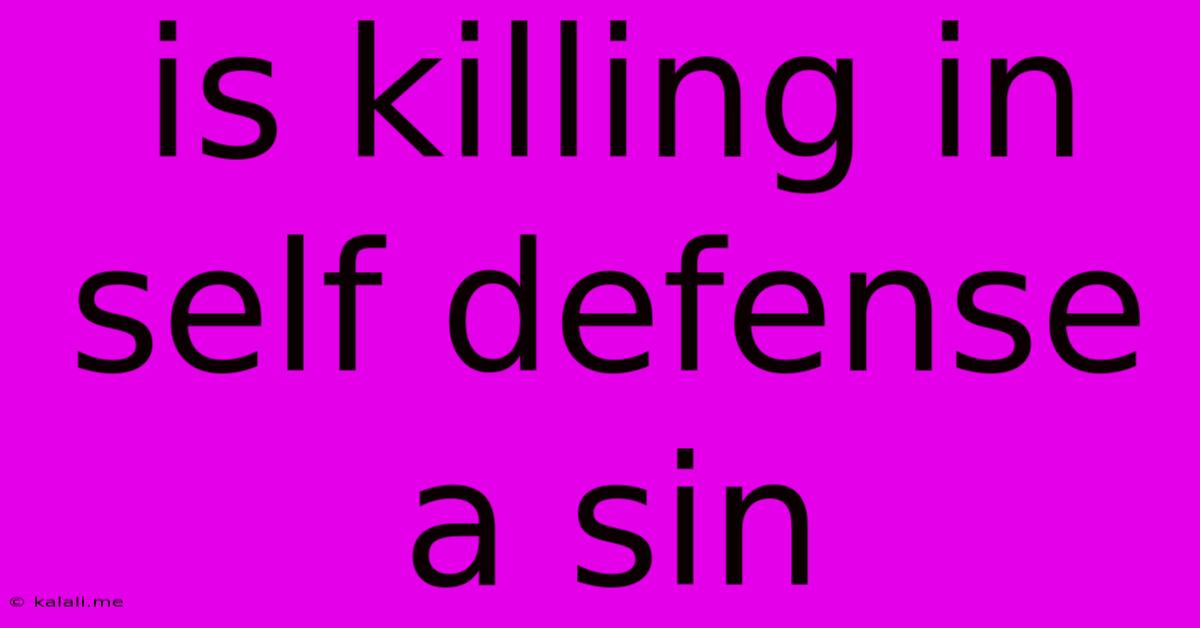Is Killing In Self Defense A Sin
Kalali
May 26, 2025 · 3 min read

Table of Contents
Is Killing in Self-Defense a Sin? A Complex Moral and Theological Question
The question of whether killing in self-defense is a sin is a complex one, debated across religious and philosophical traditions for centuries. This article will explore the nuances of this issue, examining various perspectives and considering the crucial factors that determine the moral permissibility of lethal self-defense. Understanding the context surrounding the act is paramount.
The inherent sanctity of life: Most major religions, including Christianity, Islam, and Judaism, hold the sanctity of human life as a core principle. The commandment "Thou shalt not kill" (Exodus 20:13) is often cited in this discussion. However, the interpretation of this commandment and the circumstances under which it might be overridden are points of significant theological debate.
The Doctrine of Double Effect
One key theological framework for analyzing self-defense is the Doctrine of Double Effect. This doctrine suggests that an action that has both good and bad consequences can be morally permissible if certain conditions are met:
- The act itself must be morally good or at least neutral. Simply intending to kill someone is inherently wrong.
- The good effect must be directly intended, while the bad effect is foreseen but not intended. The intention must be to protect one's life, not to kill the attacker.
- The good effect must be proportionate to the bad effect. The harm caused by the attacker must justify the use of lethal force.
- There must be no other way to achieve the good effect. All other options for self-preservation must have been exhausted.
Justifiable Homicide vs. Murder
Legally, the distinction between justifiable homicide (killing in self-defense) and murder hinges on several factors:
- Imminent threat: The threat of death or serious bodily harm must be immediate and unavoidable.
- Proportionality: The force used in self-defense must be proportionate to the threat faced. Excessive force would likely negate the claim of self-defense.
- Reasonable belief: The person acting in self-defense must have a reasonable belief that their life or the lives of others are in imminent danger.
Religious Perspectives
Different religious perspectives offer varying interpretations on the permissibility of killing in self-defense:
- Christianity: While the sanctity of life is paramount, many Christian theologians acknowledge that self-defense, when fulfilling the conditions of the Doctrine of Double Effect, is not inherently sinful. The focus is on the intention behind the act and the proportionality of the response.
- Islam: Similar to Christianity, Islamic jurisprudence permits the use of lethal force in self-defense, particularly when facing an imminent threat to life. However, the principle of proportionality and the absence of alternative means of defense are crucial.
- Judaism: Jewish law also allows for self-defense, emphasizing the preservation of life as a paramount value. The act must be proportionate and necessary to avert immediate danger.
The Emotional and Psychological Toll
Beyond the moral and legal aspects, it's crucial to acknowledge the significant emotional and psychological burden that taking a human life, even in self-defense, can inflict. The trauma of such an experience can have long-lasting effects, requiring professional support and understanding. Seeking counseling and support is crucial for processing this complex and deeply impactful event.
Conclusion
The question of whether killing in self-defense is a sin is not easily answered with a simple yes or no. The morality of such an act depends heavily on the specific circumstances, the intention of the actor, and the adherence to principles like the Doctrine of Double Effect and the legal requirements for justifiable homicide. Understanding the nuances of this issue requires careful consideration of ethical, theological, and legal perspectives, alongside the profound emotional impact on the individual involved. Seeking guidance from religious leaders and legal professionals can provide valuable insights in these challenging situations.
Latest Posts
Latest Posts
-
My Teen Romantic Comedy Snafu Season 1
May 27, 2025
-
How To Get Glass Out Of Garbage Disposal
May 27, 2025
-
Is John The Baptist The Same As John The Apostle
May 27, 2025
-
Why Do I Run Out Of Hot Water So Fast
May 27, 2025
-
How Do I Get A Key Out Of A Lock
May 27, 2025
Related Post
Thank you for visiting our website which covers about Is Killing In Self Defense A Sin . We hope the information provided has been useful to you. Feel free to contact us if you have any questions or need further assistance. See you next time and don't miss to bookmark.